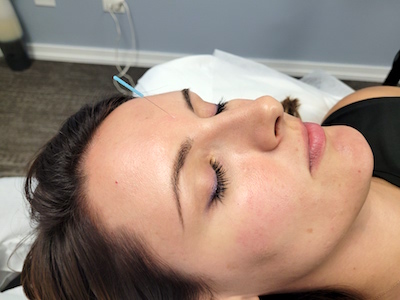Chicago Acupuncture for Anxiety and Stress

Why do we experience anxiety and stress?
Anxiety and stress are feelings that virtually all of us are familiar with. Whether it be problems at work, financial troubles, relationship difficulties, an illness, or any other situation where we might feel we are outside our comfort zone, stress is a common part of human life. When we are healthy and the stress is short-lived, we are usually able to recover from stressful situations relatively unscathed. However, if stress and anxiety are prolonged and/or coupled with other emotional or physical disruptions, they begin to have serious consequences on our overall well-being.
Stress served as an important survival trait during our hunter gatherer days. It affects the sympathetic nervous system, which initiates the instinctive "fight or flight" response when we are met with a dangerous or stressful situation. On a physical level, this response causes some dramatic temporary physical changes, such as increased heart rate, increased blood circulation, increased oxygen intake, dilation of pupils, and shutdown of digestive functions - all designed to enable us to either flee or combat a perceived danger for survival.
Unfortunately, this response by our sympathetic nervous system does not fit as well into modern living, where most of our stressful situations are met at home or at work. Unlike in our cave-dwelling days, stressful situations tend to be more long-term and cannot usually be resolved by fleeing or fighting. As a result, levels of cortisol, the body's natural stress hormone, become elevated, resulting in high blood pressure, increased abdominal fat, increased blood sugar, lowered immune function, and decreased cognitive performance. Over time, this can cause long-term disruptions to our physical and mental health such as fatigue, depression, digestive issues, sleep problems, weight gain, fertility issues, headaches, and other pain problems.
How can acupuncture help with stress and anxiety?
In Traditional Chinese Medicine, physical and emotional imbalances are closely linked in the sense that one type of imbalance can cause or exacerbate the other. Prolonged disruptive emotions like stress and anxiety cause obstructions in the natural flow of energy in the body, which can cause pain and illness. For example, chronic stress often manifests itself with muscle tension and pain in the upper back and neck, often also leading to headaches. Physical pain often leads to even more anxiety, resulting in a perpetuating cycle of imbalance.
Acupuncture combats stress by breaking this cycle of imbalance. It does this by freeing up the obstructions in the flow of energy and thereby restoring natural balance to the body. This not only helps to alleviate the physical manifestations of stress, such as pain, digestive disorders, and sleep issues, but it also directly combats stress itself.
From a scientific perspective, acupuncture helps stimulate the parasympathetic nervous system. This is the "rest and digest" response, the opposite of the "flight or flight" response. One way it does this is by causing the release of natural "feel good hormones", biochemicals such as endorphins and serotonin, in the brain and body. These chemicals act as pain-killers and relaxants, which have a calming effect and signal to the body that it's safe to relax. The calming effect of acupuncture decreases heart rate, lowers blood pressure and relaxes the muscles, thus alleviating many of they physical issues associated with stress. Additionally, acupuncture increases blood circulation and lowers stress hormones, such as cortisol, which can wreak havoc on the mind and body. Acupuncture does this without side effects. In fact, many patients report that they sleep better, have a greater sense of well being, and feel more at ease in the face of everyday stressors after just one or two visits.
Although each patient is treated holistically and individually with acupuncture for the treatment of stress and anxiety, some of the commonly used acupuncture points include:
- Yin Tang - this acupuncture point in the middle of the forehead is a powerful centering and calming point.
- CV17 - this acupuncture point in the middle of the chest influences the heart and opens the diaphragm to help relax the breathing.
- HT7 - this acupuncture point along the heart meridian on the outside of the wrist is helpful for promoting restful sleep and quieting the mind.
- Ear Shen Men - this acupuncture point on the ear helps to calm the spirit and quiet the heart and mind.
- PC6 - this acupuncture point on the inside of the wrist is well known in helping to treat nausea, but is also great for calming the mind and decreasing anxiety.
- Four Gates - this set of 4 acupuncture points on the hands and feet help to free up the flow of energy throughout the entire body to help relax the body and increase blood and energy flow.
Our Licensed Acupuncturists have many years of experience treating anxiety and stress with acupuncture and other natural therapies. Our clean and modern office in the Chicago Loop provides a safe and relaxing environment for acupuncture treatments. Contact us to schedule an appointment with one of our board certified Chicago acupuncturists and start feeling better today!
